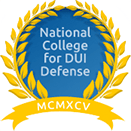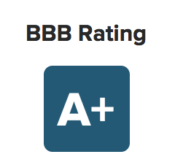Table of Contents
Are you facing charges of refusal of breathalyzer in NJ? A refusal to submit to a breath test after being stopped on suspicion of drunk driving in New Jersey is common. What you should know is that a conviction of breath test refusal charges carries costly fines and penalties, including the suspension of your driver’s license. If you have questions regarding how to respond to breath test refusal charges, a DWI defense attorney at the Law Offices of Jonathan F. Marshall is ready to discuss your questions at 855-450-8310.
Here’s how to get help if you are charged with refusal of breathalyzer in NJ
Our N.J. breath test refusal attorneys will review the circumstances of your arrest in New Jersey and discuss your legal options. Our law firm has one of New Jersey’s most experienced criminal defense teams composed of former prosecutors and public defenders, who know how to find the weaknesses in the prosecution’s case. Our defense attorneys have more than 100 years of combined legal experience including extensive jury trial experience.
Contact us today to schedule a free initial consultation about your rights. We have nine offices across New Jersey and can get to work promptly on your case. Our attorneys have decades of experience defending individuals facing charges related to driving while impaired.
N.J. Implied Consent
Any individual who drives a motor vehicle on a public road or highway in New Jersey gives his or her implicit consent to submit to a breath test if suspected of driving while intoxicated.
A police officer must have reasonable grounds to believe that a person is driving while intoxicated to justify the collection of a breath sample to determine the content of alcohol in the individual’s blood.
If the individual refuses to submit to a test, the police officer shall inform the person arrested of the consequences of refusing to submit to a test.
Can You Refuse a Breathalyzer Test in New Jersey?
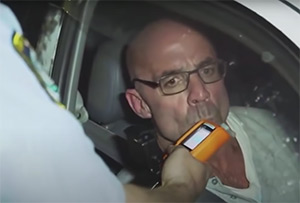 When you obtain a driver’s license in New Jersey, you automatically give your consent under the NJ Consent Law to provide a breath sample when requested to do so by police. The refusal to perform a breathalyzer test subjects an individual to a range of penalties and punishments set forth under N.J.S.A. 39:4-50.4, commonly referred to the as the New Jersey Refusal Law.
When you obtain a driver’s license in New Jersey, you automatically give your consent under the NJ Consent Law to provide a breath sample when requested to do so by police. The refusal to perform a breathalyzer test subjects an individual to a range of penalties and punishments set forth under N.J.S.A. 39:4-50.4, commonly referred to the as the New Jersey Refusal Law.
The following are common examples of situations in which an individual may be charged with refusal to submit to a breathalyzer test:
- Silence— In order to consent to a breathalyzer test, an accused must assert a willingness to perform the test. And while an individual possesses a constitutional right to remain silent, our courts have expressly held that this right does not apply to questioning regarding consent to a breath test. Accordingly, silence is almost always construed as a refusal to submit to the breathalyzer.
- Short Samples— Following proper consent to the test, sometimes an individual with “fake” a blow, intentionally minimize their blowing or just be unable to provide sufficient air volume or maintain volume for the necessary time period to register a valid reading. A refusal charge can be issued when this occurs.
- Express of Outright Refusals— When an individual’s consent is a flat “no”, a summons for refusing to provide a breath sample may immediately be filed. In addition, there is no requirement that police read the second paragraph of the Standard Consent when there is an express refusal.
- Delaying or Stalling Administration— This occurs if an individual engages in any tactics that are obviously intended to delay the efforts to start the test. In this regard, the Supreme Court of New Jersey clearly stated in State v. Widmaier, 157 N.J. 475 (1999), an individual suspected of driving while intoxicated has no right to delay breathalyzer testing; efforts to stall can, therefore, be interpreted as a refusal.
- Conditional Consent— Our courts have expressly held that anything short of an unequivocal “yes” or “I will”, can be construed as a refusal. As a result, if an accused individual responds to a police officer with “if…”, “can you tell me…” or anything other than an affirmative and unconditioned agreement to take the test, it is to be interpreted as a failure to submit to the breathalyzer test.
To obtain a conviction under 39:4-50.4, the state must prove that: (1) the police officer possessed probable cause to believe that the accused was driving while intoxicated or operating under the influence of drugs; (2) the defendant was arrested for DWI or DUI; (3) there was a proper request to submit a breath sample; and (4) the accused refused to perform the test.
Our attorneys regularly uncover issues revealing that the charge of breathalyzer test refusal is improper. Our attorneys have found that silence can often provide a basis for bona fide arguments to avoid conviction. The types of questions we examine when investigating these cases include:
- Did the police have a reasonable basis to believe that the accused was intoxicated to support the request to take a breath test?
- Did the officer follow the law when informing the driver of his or her rights regarding the breathalyzer test?
- Did the motorist really refuse? Were there language barriers?
- Did the motorist understand what was being requested?
From having handled many similar cases, our attorneys have the knowledge and experience to identify issues revealing that the charge of breath test refusal is improper.
Plea Bargain for Breath Test Refusal
As you probably know, it is illegal to plea bargain a DWI charge in New Jersey.
A prosecutor also is prohibited from plea bargaining a first offense charge of refusal to submit a breath sample. However, a skilled defense lawyer may be able to identify legitimate issues regarding the arrest and police procedure, paving the way for valid dismissal of the charges
The prohibition on plea bargaining does not apply, however, to a second or subsequent offense of refusal to submit to a breath test. A possible plea bargain is an important consideration when dealing with these charges since the conviction of a second or subsequent refusal offense carries a license suspension of two to ten years. A prosecutor may dismiss a refusal charge in consideration of a guilty plea on a related DWI charge.
A skilled criminal defense attorney may be able to provide a significant benefit to a client by negotiating with a prosecutor to allow a plea bargain in a refusal case. Having worked as prosecutors, our defense attorneys at the Law Offices of Jonathan Marshall understand how to structure a plea agreement that a prosecutor will find acceptable.
What is the Penalty for Refusing to Take a Breath Test?
First Offense
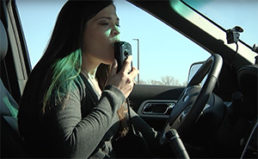 If an individual is convicted of his or her first offense of refusing a breath test under N.J.S.A. 39:4-50.4, there are mandatory NJ DWI refusal penalties that the court must impose. A first offense conviction includes:
If an individual is convicted of his or her first offense of refusing a breath test under N.J.S.A. 39:4-50.4, there are mandatory NJ DWI refusal penalties that the court must impose. A first offense conviction includes:
- Fine—A fine of $300 to $500 and a mandatory drunk driving enforcement fund surcharge
- License Suspension—A mandatory license suspension of between seven and 12 months. The suspension may run concurrently with a related DWI conviction at the judge’s discretion.
- Intoxicated Drivers Resource Center— A first offense requires 12 hours in the IDRC, an alcohol education program.
- Ignition Interlock—An ignition interlock must be installed on all registered vehicles for the period of the license suspension plus an additional period, upon restoration of driving privileges, of between six and twelve months.
- Division of Motor Vehicle Surcharge—An individual must pay a surcharge of $1,000 per year for three years for the first offense.
Second Offense
The minimum period of license suspension is two years if convicted of a second offense of refusal to submit to a breath test. The court is required to impose other penalties as well.
- Fine—The fine for a second conviction of breath test refusal ranges between $500 and $1,000 and a mandatory drunk driver enforcement fund surcharge.
- Jail—There is no mandatory jail sentence for a second offense of refusal. Therefore, there is a clear incentive to plead to N.J.S.A. 39:4-50.4 instead of a related driving while intoxicated charge if you are charged with both.
- License Suspension—An individual will have his or her license suspended for a period of two years if convicted of a second refusal to submit to a breath test or for refusing after a previous DWI conviction.
- Ignition Interlock— An ignition interlock device must remain in all registered vehicles for the period of the license suspension, plus an additional one to three years after license restoration.
- Motor Vehicle Surcharges—An individual convicted of a second offense of refusing to submit to a breath test will have to pay a mandatory DMV surcharge of $1,000 a year for three years, and his or her license will remain suspended until the surcharge is paid in full.
Third Offense
The penalties are harsh for a third conviction of charges refusal to take a breath test in New Jersey, including a mandatory 10-year license suspension. They include:
- Fine— The fine for a third conviction of refusal is $1,000 and a drunk driver enforcement fund surcharge of $100.
- License Suspension— An individual will have his or her license suspended for a period of ten years if convicted.
- Intoxicated Drivers Resource Center— A third conviction of refusal requires participation in an alcohol education program. The IDRC may impose conditions on the restoration of the driver’s license such as mandatory attendance at Alcoholics Anonymous meetings.
- Ignition Interlock— An ignition interlock device must remain in all registered vehicles for the period of the license suspension, and for one to three years after license restoration.
What the Prosecutor Must Prove
To obtain a conviction under 39:4-50.4, the state must prove that: (1) the police officer possessed probable cause to believe that the accused was driving while intoxicated or operating under the influence of drugs; (2) the defendant was arrested for DWI or DUI; (3) there was a proper request to submit a breath sample; and (4) the accused refused to perform the test.
- The Probable Cause Requirement. An officer fulfills this element where he possesses a well-grounded suspicion that the accused was the operator of a motor vehicle and was under the influence of alcohol or drugs at that time. In terms of “operation”, New Jersey refusal cases provide that an intention to operate satisfies this requirement. Accordingly, police can request the performance of a breath test if there is reasonable suspicion to believe that the accused operated or intended to operate a vehicle. Reasonable suspicion of intoxication must also be established and this subject is discussed in more detail at Probable Cause to Arrest.
- Arrest. The arrest requirement is self-evident — an arrest either happened or it didn’t.
- Proper Demand to Perform the Test
- Accused Refused. This question is easy to answer when someone flat out refuses. This occurs where the accused responds affirmatively with a “NO” or the equivalent. We have included a link to State v. Pandoli which discusses the subject of flat refusal in more detail. There are also those cases where the accused remains silent after being read the consent form. While courts have concluded that silence does not suffice as a proper response, our attorneys find that silence can often provide a basis for a bona fide argument to avoid conviction. We have prepared individual pages with respect to the more complicated issues on this subject including insufficient breath volume or test samples, language barriers, and physical incapacity.
- Burden of Proof. The state has the burden of proving each and every element of a refusal charge beyond reasonable doubt.
- Adverse Inference. If someone refuses to take the breathalyzer, the law allows this conduct to be used as evidence in proving that an accused was driving while intoxicated. In other words, the municipal court judge deciding a DWI charge may infer from the refusal that the defendant was drunk. A copy of the main case on this subject by clicking State v. Stever.
- Delay in Administering the Test. It is obviously understandable that an accused would attempt to delay blowing into the breath test machine if they fear a positive result. Conversely, the police want the test done promptly as there is a legal requirement that the breath sample is obtained within a reasonable period of time after operation and/or arrest. NJ courts have held that intentional delay by an accused in blowing or even responding to a request for consent may be construed as a refusal. It can be a very grey area when a delay is used as the basis for refusal and this is where representation by a seasoned dwi lawyer like the ones at our firm can prove invaluable.
- Other Important Considerations. We have provided additional subject pages on Curing a Refusal, the Confusion Doctrine, Out of State Refusal Convictions, Right to an Independent Chemical Test, and Division of Motor Vehicle Administrative Suspension for Refusal. We should also keep in mind that, while refusal is a separate offense from a DWI charge, a prosecutor is obviously lacking scientific evidence to convict you of drunk driving. Field sobriety tests, eye witness observations, and other “probable cause” evidence will, therefore, have to be used to prove intoxication and this evidence can be inaccurate — our attorneys will challenge them as insufficient evidence for a DUI/DWI conviction. For additional information concerning the elements of the offense and the standard of proof to be applied in a Refusal case, the New Jersey Supreme Court decision of State v. Cummings 184 N.J. 84 (2005 is provided. For a discussion on what constitutes probable cause to request submission to a breath test, refer to State v. Wright 107 N.J. 488 (1987). You can also refer to State v. Sherwin 236 N.J. Super 510 (App. Div 1989), for information concerning the number of breath samples and consistency between the samples, which is required under the law of New Jersey.
School Zone Refusal
An entirely separate offense from a standard refusal is potentially triggered when the related operation is within a school zone. Whn this occurs, an individual is exposed to an enhanced charge known as Refusal in a School Zone that is contained at N.J.S.A. 39:4-50.4a.
To be considered a school zone, the zone must be within 1,000 feet of an elementary or secondary school. A charge may be brought regardless of whether the motorist had knowledge that he or she was driving in a school zone.
Contact a New Jersey Breath Test Refusal Lawyer
Every situation is unique, and there are a number of defenses to drunk driving charges and refusal charges. Never assume you should automatically plead guilty to either a DWI or refusal charge. If you would like to speak with one of our lawyers about the circumstances surrounding your arrest, please call toll-free 855-450-8310 or e-mail our law firm to arrange a free consultation with a lawyer. There is no charge for the initial consultation so there is no need to hesitate in contacting us.
Frequently Asked Questions for Refusing a Breathalyzer Test in New Jersey
Breath Test Refusal
Can I Be Requested to Take a Breath Test Without My Lawyer Present?
You may have heard from TV shows or family members that the best thing you can do if you are ever arrested is to plead the fifth and refuse to talk or do anything without a lawyer present. This is true in most legal situations. However, because of the nature of DWI’s and your body’s ability to lower its BAC over time it is important for the prosecution to get a Blood Alcohol Content (BAC) reading as soon as possible. Because of this, if you refuse to take a breath test on the grounds that you want your lawyer to be present you will be charged with a refusal.
Can You Refuse a Breath Test in New Jersey?
Since driving in the United States is considered a privilege and not a right, you are required to follow certain conditions in order to enjoy the privilege of driving. One of these conditions is that you will consent to a breath test if the police suspect that you are intoxicated. Because of this, If you refuse to submit to a breath test after an officer has requested one from you, it will result in a ticket that is similar to a DUI/DWI. The ticket is referred to as a refusal under N.J.S.A. 39:4-50.4a. A refusal is much easier to prove in court than a DWI because the prosecution just has to prove that there was probable cause to suspect that you were driving under the influence and that you refused the breath test.
Am I Allowed to Refuse a Sobriety Test in New Jersey?
Many New Jersey drivers eventually find themselves in a situation where they have been pulled over by a police officer under the suspicion of a DUI/DWI. This situation can occur whether you have been drinking or whether you are completely sober. Either way, your behavior in this situation is paramount and you should do your best to avoid self incrimination.
In New Jersey you have the right to refuse all sobriety tests, however refusing these tests may result in a ticket or be used as evidence against you. So, there is no simple answer as to whether or not you should consent or refuse a sobriety test. The answer is not simple because it depends on many different variables including the circumstances of the traffic stop, medical problems, and many other situational issues.
When addressing sobriety tests it is important to know that there are different types of tests and refusal of these tests can have differing results. The main two tests used in DWI convictions in New Jersey are Field Sobriety Tests (FSTs) and chemical tests such as the Breath Test.
What Are DWI Tests?
Blood Test
A blood test involves analyzing a person’s blood sample to determine the presence of alcohol or drugs in their system. This test is considered one of the most accurate methods for measuring a person’s level of intoxication. This is permitted under N.J.S.A. 39:4-50.2.
Breathalyzer Test
A breathalyzer test measures a person’s blood alcohol concentration (BAC) by analyzing their breath. It estimates the amount of alcohol in the bloodstream and is commonly used by law enforcement officers during traffic stops.
Field Sobriety Test
Field sobriety tests are physical and cognitive tests conducted by law enforcement to assess a driver’s impairment. These tests evaluate coordination, balance, and mental acuity.
What Is The NJ Implied Consent Law (39:4-50.4a)?
The NJ Implied Consent Law states that anyone who operates a motor vehicle on New Jersey roadways is deemed to have given their consent to chemical tests to determine their BAC or the presence of drugs. Refusing to take these tests can lead to legal consequences. Under this law, if a driver refuses to submit to a breathalyzer or blood test, they may face penalties separate from those imposed for a DWI offense.
What Are The Penalties For A Second Refusal To Submit To A DUI Test?
Individuals that have a history of refusing to submit to DWI tests may face more severe penalties. New Jersey has strict penalties for repeat offenses, including increased fines, longer license suspensions, mandatory installation of an ignition interlock device, and mandatory participation in alcohol education or treatment programs, including the intoxicated driver resource center (IDRC) programs.
What Is The Suspension Period For Drivers Under The Age Of 21?
For drivers under the age of 21 who refuse or fail to provide blood or breath samples, the penalties can be particularly severe. New Jersey has a zero-tolerance policy for underage drinking and driving. The license suspension period for a refusal or failure to complete a test can range from six months to two years, depending on the circumstances and prior offenses. Additionally, underage drivers may be required to complete an alcohol education or treatment program before their driving privileges are reinstated.
Can Your Driver’s License Be Immediately Suspended If You Refuse To Take A Field Sobriety Test?
In New Jersey, the Implied Consent Law applies, which means that by accepting the privilege to operate a motor vehicle, drivers implicitly consent to submit to chemical tests if they are lawfully arrested for driving under the influence. However, it’s important to note that refusing a field sobriety test does not result in an immediate suspension of your driver’s license. The refusal typically relates to the chemical tests, which we will discuss in the next point.
Is It Possible For Defendants To Contest The Revocation Of Their Driver’s License For Refusing A Chemical Test?
Yes, defendants can contest the revocation of their driver’s license for refusing a chemical test. It’s essential to understand that the consequences for refusing a chemical test are separate from the penalties for a DUI conviction. To contest the revocation, individuals can seek legal representation and present their case in court. The Law Offices of Jonathan F. Marshall specializes in defending DUI cases in New Jersey and can provide valuable guidance and support in the case of breath test refusal charges.
Are There Any Potential Defenses Available For Individuals Charged With A DUI After Refusing A Field Sobriety Test?
When facing a refusal charge, several potential defenses exist. These may include challenging the legality of the traffic stop, disputing the officer’s observations, questioning the accuracy of the test results, or asserting violations of constitutional rights. Consulting with an experienced DUI attorney can help explore and determine the most appropriate defense strategy based on the specific circumstances of the case.
Can A Driver Refuse To Take A Field Sobriety Test?
Yes, drivers have the right to refuse to take a field sobriety test. However, it’s important to note that refusing a field sobriety test may lead to the officer having probable cause to make an arrest based on other observed signs of impairment. Additionally, it’s essential to understand that refusing a field sobriety test does not carry the same penalties as refusing chemical tests.
Which Types Of Chemical Tests Are Commonly Refused By Drivers?
The two primary types of chemical tests commonly used in New Jersey are breath tests and blood tests. Breath tests, such as the Breathalyzer, measure a person’s blood alcohol concentration (BAC) by analyzing their breath sample. Blood tests involve drawing a blood sample to determine the BAC. Both types of tests can be refused, but it’s crucial to be aware of the potential consequences of refusal.
Can You Refuse To Take A DUI Test Even Though It Is Required By Law?
While you have the right to refuse a DUI test, it’s important to note that New Jersey’s implied consent law mandates that drivers submit to chemical tests if lawfully arrested for driving under the influence. Refusing the test can result in administrative penalties, such as driver’s license suspension, as per the guidelines outlined by the New Jersey Motor Vehicle Commission.
Is A Forced Blood Draw Permitted For Individuals Who Refuse A Breath Test?
In certain situations, when a driver refuses a breath test, a police officer may seek a warrant to conduct a forced blood draw. This allows them to obtain a blood sample for testing purposes. It’s important to note that the circumstances surrounding a forced blood draw can vary, and seeking legal advice is crucial if you find yourself in such a situation.
What Are The Potential Advantages Of Refusing DUI Tests?
Refusing DUI tests may have certain potential advantages. By refusing the tests, individuals avoid providing potentially incriminating evidence against themselves. This can make it more challenging for the prosecution to establish a driver’s level of intoxication. However, it’s important to remember that refusing a test does not guarantee immunity from penalties as driver’s license suspension may still apply.
What Factors Should A Driver Consider When Deciding Whether To Refuse A DUI Test?
When deciding whether to refuse a DUI test, several factors should be considered. These may include the specific circumstances of the traffic stop, the presence of any prior DUI convictions, the potential consequences of refusal, and the availability of legal representation. Consulting with an experienced DUI attorney can provide invaluable advice and help make an informed decision based on individual circumstances.
How Can A New Jersey DWI Refusal Lawyer Help Me?
Refusing to submit to a DWI test in New Jersey is a decision that carries significant consequences. It’s crucial to understand the implications and potential penalties involved. The administrative penalties, criminal consequences, and license suspension periods should all be carefully considered. If you find yourself facing a DWI charge or contemplating refusing a test, it’s essential to pursue a free consultation with knowledgeable DUI lawyers at The Law Offices of Jonathan F. Marshall, who can provide guidance on New Jersey refusal law and on your specific circumstances.

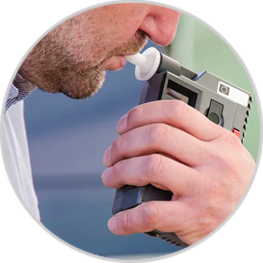
 N.J. Implied Consent
N.J. Implied Consent 




